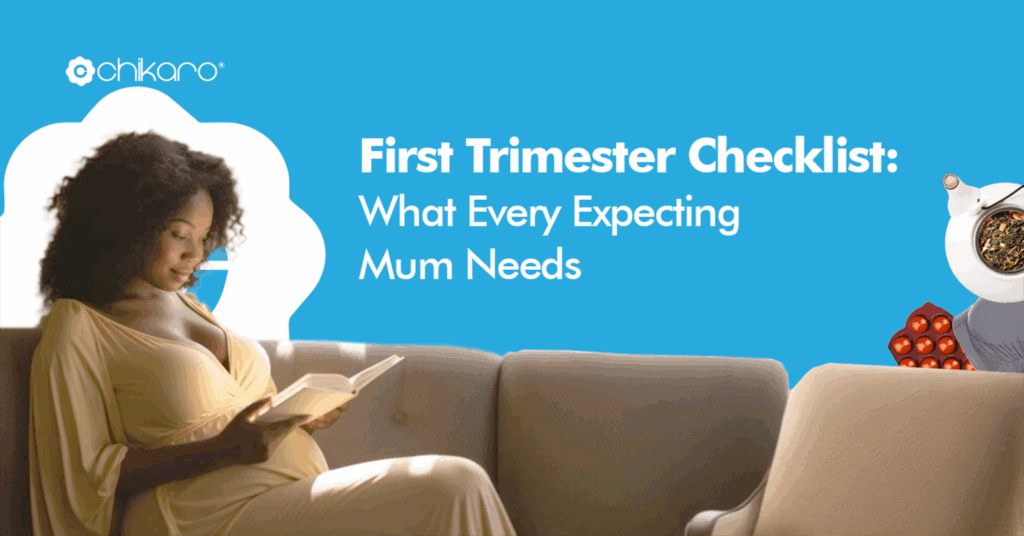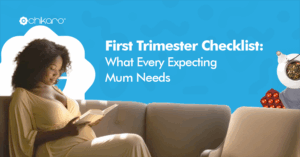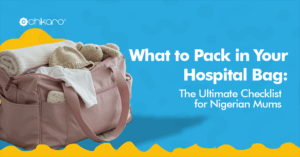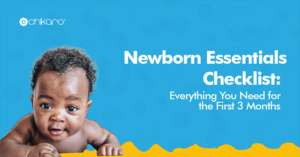Congratulations! you’re pregnant. Now it’s time for a first trimester checklist!
Whether it’s your first time or your third, the first trimester (weeks 1–12) sets the foundation for a healthy pregnancy. It can be exciting, overwhelming, and full of physical and emotional changes. A well-organized first trimester checklist can help you navigate these early weeks with confidence.
At Chikaro, we believe every mum deserves a smooth and well-supported journey. In this guide, we break down everything you should do, buy, and know during your first trimester.
Medical and Health Must-Dos – – First Trimester Checklist
1. Book a Prenatal Appointment
According to the Mayo Clinic, one of the first and most important items on your first trimester checklist is to schedule your first prenatal visit with a qualified OB-GYN as soon as you find out you’re pregnant. This appointment does far more than confirm your pregnancy, it lays the groundwork for ongoing care and helps ensure both you and your baby start this journey on the healthiest possible path.
At this visit, your doctor will officially confirm your pregnancy and work out your estimated due date, which becomes the guiding timeline for the rest of your prenatal care. This information is essential, as it helps track your baby’s growth and development week by week.
The first prenatal appointment also includes early screening tests designed to assess your overall health and detect any conditions that may need special attention. These often involve blood work to check your hormone levels, blood type, and possible nutritional deficiencies. An ultrasound may be performed to confirm the pregnancy’s location and viability. In addition, doctors may screen for issues such as gestational diabetes or thyroid problems, both of which can be managed more effectively when caught early.
Including this prenatal visit as part of your first trimester checklist is critical because it not only reassures you that your pregnancy is progressing as it should but also allows your OB-GYN to establish a tailored care plan for the months ahead. It’s your first opportunity to ask questions, discuss lifestyle adjustments, and address any concerns you may have.
2. Start Taking Prenatal Vitamins.
When preparing for a healthy pregnancy, one of the most important items on your first trimester checklist is making sure you’re getting the right nutrients. Three that deserve special attention are folic acid, iron, and calcium, as they are critical to your baby’s development, especially during the earliest stages.
Folic acid is particularly vital because it helps prevent neural tube defects, which affect the brain and spinal cord. Since these structures form very early, ensuring you’re taking folic acid before conception and throughout the first trimester is one of the most effective ways to support your baby’s healthy development.
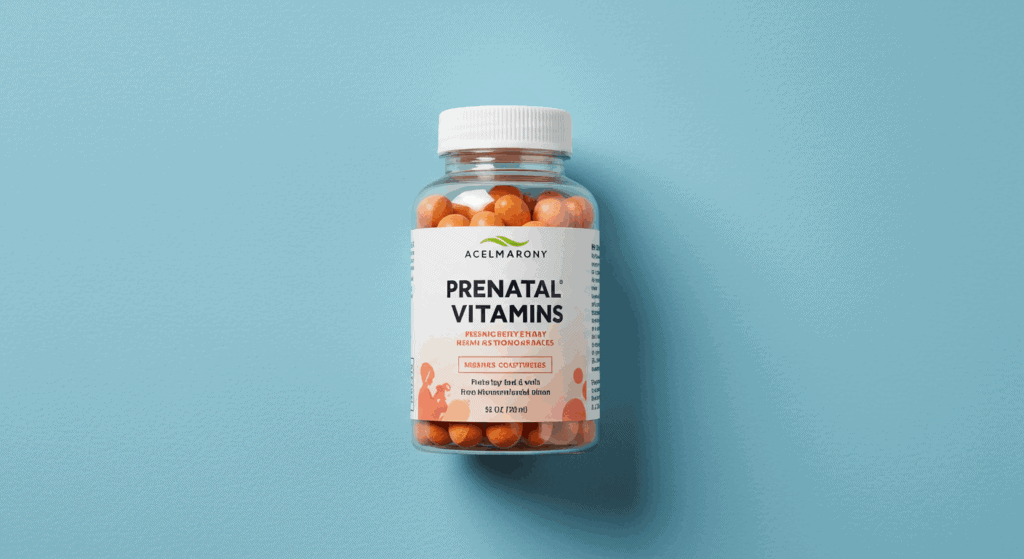
Iron also plays a key role. Your body needs significantly more iron during pregnancy to cope with the increase in blood volume. Iron supports the production of haemoglobin, which carries oxygen through your blood to both you and your baby. Without enough iron, you risk anaemia, which can leave you feeling weak and tired, and may lead to complications later in pregnancy.
Calcium is equally essential and another item that belongs on any detailed first trimester checklist. It strengthens your baby’s developing bones and teeth while also protecting your own bone health. If your diet is lacking in calcium, your body may begin to draw from your own stores, potentially weakening your bones in the long term.
Incorporating these nutrients through a combination of prenatal vitamins and healthy foods – such as leafy greens, fortified cereals, lean meats, and dairy products – ensures both you and your baby are well supported from the very beginning.
3. Review Your Medications
Another crucial item to include on your first trimester checklist is informing your doctor about any prescriptions or supplements you are currently taking. Many women may not realise that some medications and even certain vitamins or herbal remedies can pose risks during pregnancy. By sharing this information early on, your doctor can determine which ones are safe to continue and which may need to be adjusted or replaced with safer alternatives.
This step is vital because not all drugs are considered pregnancy-safe. Some can interfere with your baby’s growth and development, while others may increase the risk of complications. For example, certain pain relievers, acne treatments, or even common cold medications can have harmful effects if taken without medical guidance. That’s why experts strongly advise against self-medicating during pregnancy.
It’s also important to be cautious with over-the-counter medications. Just because they’re easy to buy doesn’t mean they’re risk-free. Always consult your doctor before starting anything new – even supplements that may seem harmless. By making this conversation part of your first trimester checklist, you’re protecting your health and creating the safest possible environment for your baby to grow.
4. Track Your Symptoms
A valuable item to add to your first trimester checklist is learning how to recognise and track common early pregnancy symptoms. Many women experience changes such as nausea, fatigue, food aversions, and breast tenderness in the first few weeks. While these symptoms are often normal, monitoring their frequency and intensity can provide important insights into your health and how your body is adjusting to pregnancy.
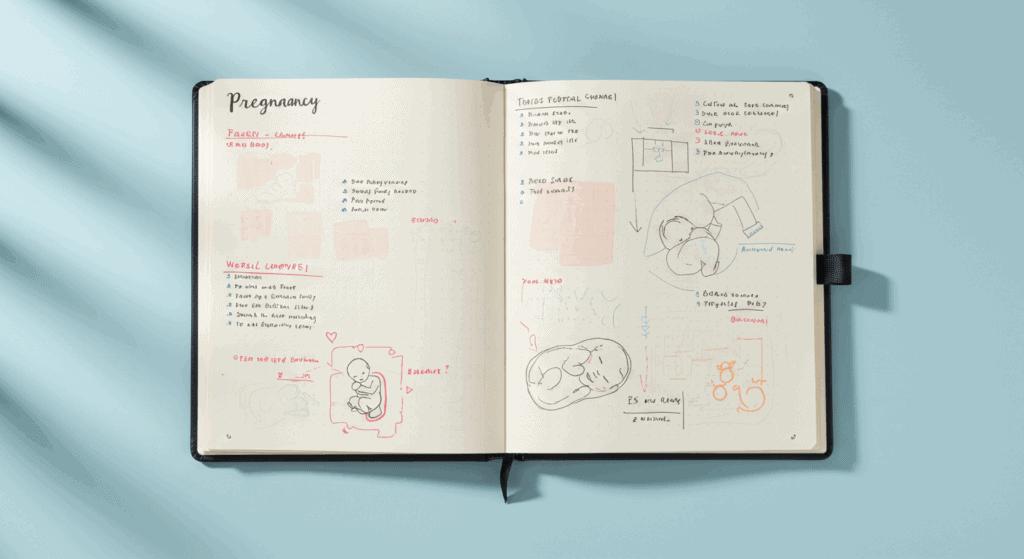
Keeping a pregnancy journal or using a mobile app to record these daily changes can be incredibly helpful. By documenting symptoms like when nausea occurs, how severe your fatigue feels, or which foods suddenly seem unappealing, you create a clear record to share with your doctor. This helps your healthcare provider identify what’s typical, what might need closer attention, and whether adjustments to your care plan are necessary.
Incorporating symptom tracking into your first trimester checklist ensures that you stay aware of your body’s signals while also giving your doctor a detailed picture of your experience. This simple practice not only supports your own peace of mind but also strengthens the partnership between you and your healthcare team throughout your pregnancy journey.
5. Get a Flu or Malaria Shot (if advised)
Another important item to include in your first trimester checklist is discussing vaccinations and preventive treatments with your doctor. Depending on your region in Nigeria and your individual health status, certain vaccines or medications may be recommended to safeguard both you and your baby during pregnancy.
For example, in areas where infectious diseases such as malaria or hepatitis B are more common, your doctor may suggest preventive measures or treatments to reduce risks. Similarly, vaccines such as the tetanus toxoid are often advised during pregnancy to protect both mother and child. These preventive steps are tailored to your location and medical history, which is why a personalised consultation is so essential.
Including this step in your first trimester checklist ensures you’re not only focusing on nutrition and lifestyle but also actively protecting yourself against illnesses that could complicate your pregnancy. By addressing these preventive measures early, you create a safer, more supportive environment for your baby’s development and strengthen your own health throughout the months ahead.
Lifestyle Changes to Make – First Trimester Checklist
1. Eat a Balanced Diet
A key item to include in your first trimester checklist is making thoughtful adjustments to your diet and eating habits. The foods you choose in these early weeks not only fuel your body but also provide essential nutrients that support your baby’s growth and development. Focusing on a balanced diet sets the stage for a healthier pregnancy and can even help reduce some of the uncomfortable symptoms common in the first trimester.
Aim to include plenty of fruits and vegetables, which are rich in vitamins, minerals, and fibre. These help with digestion, prevent constipation, and deliver antioxidants that benefit both you and your baby. Lean proteins such as fish, chicken, beans, or eggs are important for building your baby’s tissues, while whole grains supply long-lasting energy and vital nutrients like iron and B vitamins.
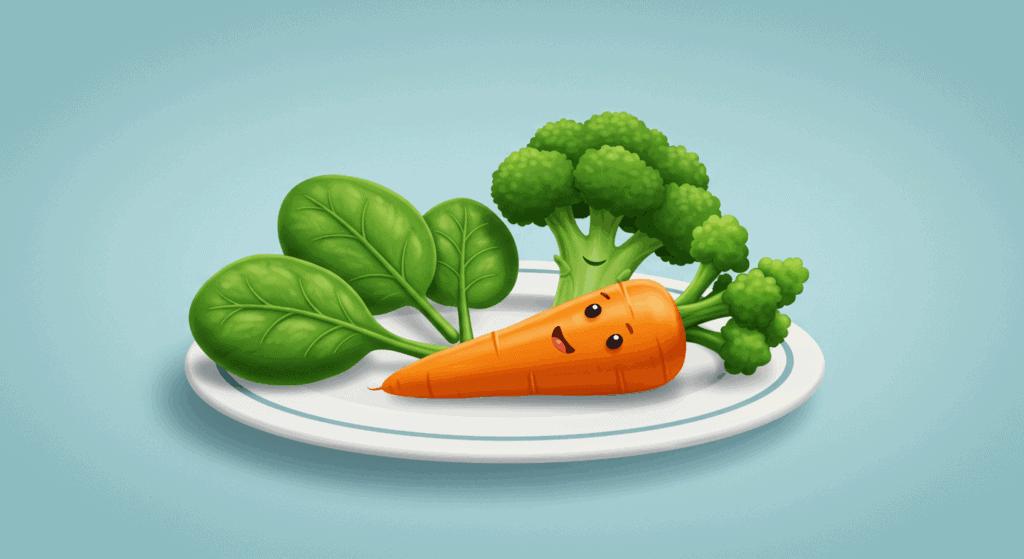
It’s also helpful to eat small, frequent meals throughout the day. This practice keeps your blood sugar steady and can ease symptoms such as nausea or morning sickness. At the same time, try to limit spicy, greasy, or overly sweet foods, as these are more likely to trigger nausea or digestive discomfort during early pregnancy.
By making smart food choices and adopting these habits as part of your first trimester checklist, you’ll be better equipped to manage common pregnancy symptoms while giving your baby the nutrition needed to thrive.
2. Stay Hydrated
One often-overlooked but essential item on your first trimester checklist is making sure you stay properly hydrated every day. Water plays a vital role in supporting your body during pregnancy—it helps maintain healthy amniotic fluid levels, which cushion and protect your baby, and it also keeps your body functioning efficiently as blood volume increases.
Drinking enough water can also reduce fatigue, a common early pregnancy symptom caused by hormonal changes and your body’s extra energy demands. Proper hydration supports circulation, digestion, and temperature regulation – all of which are more important than ever when you’re expecting.
In addition to plain water, you can stay hydrated by including water-rich fruits and vegetables such as watermelon, cucumber, and oranges in your diet. These not only boost hydration but also provide vitamins, minerals, and fibre. Carrying a reusable water bottle, setting reminders to drink, and choosing refreshing snacks are simple strategies to ensure hydration becomes a daily habit.
By making hydration a clear part of your first trimester checklist, you’re helping both your body and your baby thrive during these crucial early weeks.
3. Get Enough Rest
Another important item to include in your first trimester checklist is learning how to manage fatigue, which is one of the most common and challenging symptoms in early pregnancy. The body is working overtime to support the growing baby—hormonal shifts, increased blood production, and physical changes all contribute to a deep sense of tiredness that can feel overwhelming at times.
To cope with this, it’s essential to prioritise rest and quality sleep. Going to bed earlier, keeping a consistent sleep routine, and creating a calm nighttime environment can help improve your energy levels. During the day, don’t hesitate to take naps when needed—short rest periods can make a big difference in how you feel and function.
At the same time, avoid overexertion. While staying active is important, pushing yourself too hard can worsen fatigue. Instead, focus on gentle, low-impact activities such as stretching, walking, or prenatal yoga, which can boost circulation, ease stress, and support overall well-being without draining your energy.
Including strategies to manage fatigue in your first trimester checklist ensures that you listen to your body’s signals and give yourself permission to slow down when necessary. Resting now not only restores your energy but also creates a healthier environment for your baby’s growth.
4. Avoid Harmful Substances
A non-negotiable item on your first trimester checklist is making safe lifestyle choices by avoiding smoking, alcohol, and self-medication. These habits can directly harm your baby’s development and increase the risk of serious complications such as miscarriage, premature birth, or low birth weight. Stopping these behaviours as early as possible is one of the best ways to protect your pregnancy.
Another key point is caffeine intake. While small amounts are generally considered safe, experts recommend keeping it below 200mg per day—roughly the amount in one 12-ounce cup of coffee. Consuming more than this may increase the risk of miscarriage or interfere with your baby’s development.
It’s also important to be cautious with herbal teas and traditional remedies. Even though they may seem natural or harmless, not all are safe during pregnancy. Some herbs can stimulate the uterus or affect blood flow, potentially putting your pregnancy at risk. Always discuss any herbal products or home remedies with your doctor before using them.
By making these safe choices and adding them to your first trimester checklist, you’re creating a healthier environment for your baby to grow while also giving yourself the best chance for a smooth pregnancy.
5. Reduce Stress
An often-overlooked but highly beneficial item on your first trimester checklist is making time for stress management and emotional wellbeing. Pregnancy brings not only physical changes but also emotional shifts due to fluctuating hormones and the anticipation of motherhood. Learning to care for your mental and emotional health early on can make your journey smoother and more positive.
Simple techniques such as mindfulness and meditation can help you stay grounded and reduce feelings of anxiety. Even short daily practices, like focusing on your breathing or writing in a gratitude journal, can improve your mood and lower stress levels. Gentle walks in fresh air and listening to calming music are also effective ways to create moments of relaxation while keeping your body lightly active.
For extra support, some women explore prenatal massage or aromatherapy. When performed by trained professionals and using safe, pregnancy-appropriate oils, these therapies can ease muscle tension, reduce stress, and promote better sleep. However, it’s always important to consult your doctor before starting any complementary therapy.
By including stress-relief practices in your first trimester checklist, you prioritise not just physical health but also emotional balance. This holistic approach strengthens your overall wellbeing and creates a calm, nurturing environment for your baby’s growth.
Emotional Well-Being – First Trimester Checklist
1. Talk About It
Another meaningful item to add to your first trimester checklist is deciding when and how to share the news of your pregnancy with your partner and close circle. While the physical aspects of pregnancy are vital, the emotional support you receive during this time is equally important. Having the right people around you can make the journey less overwhelming and far more joyful.
Start by openly communicating with your partner. Sharing your experiences, symptoms, and even your worries helps strengthen your bond and ensures you’re both involved in the journey from the very beginning. A supportive partner can encourage healthy habits, accompany you to prenatal visits, and provide comfort when fatigue or morning sickness makes daily life difficult.
Beyond your partner, it’s also valuable to build a wider support system. Trusted family members, close friends, or even connecting with other mums – whether in person or through support groups – can give you the encouragement and reassurance you need. Pregnancy can sometimes feel isolating, especially during the first trimester when many symptoms are new, but surrounding yourself with people who understand makes a big difference.
Including emotional support as part of your first trimester checklist reminds you that pregnancy isn’t something you have to go through alone. Sharing the journey with others creates a strong foundation of love, care, and understanding that will carry you through the months ahead.
2. Manage Mood Swings
An essential item to include in your first trimester checklist is paying attention to your emotional and mental health, especially as your body undergoes significant hormonal changes. These shifts can often trigger anxiety, mood swings, or unexpected feelings of sadness and irritability. While these reactions are common, they can feel overwhelming if not managed with care.
One effective tool is journaling. Writing down your thoughts and emotions helps you process your experiences and notice patterns in your mood. It also gives you a safe outlet to release worries or track triggers that might be affecting your mental health.
For more structured support, consider therapy or counselling. Speaking with a professional allows you to explore your feelings in a guided and supportive environment, helping you build healthy coping strategies. In addition, maintaining honest conversations with loved ones – whether with your partner, family members, or trusted friends – ensures you don’t carry the emotional weight of pregnancy alone.
By adding mental health support practices to your first trimester checklist, you acknowledge that pregnancy isn’t just about physical changes, it’s also about nurturing your emotional wellbeing. Taking care of your mind during this stage lays the groundwork for a calmer, more balanced journey into motherhood.
3. Join a Community
A supportive community is one of the most powerful resources you can lean on during pregnancy, which is why joining mum groups belongs on your first trimester checklist. Whether online or in person, these groups provide guidance, friendship, and a safe space to share your journey with others who understand what you’re going through.
Connecting with other expecting mothers allows you to ask questions, exchange tips, and learn from women who may be just a few steps ahead in their pregnancy. The reassurance that you’re not alone—whether you’re dealing with nausea, fatigue, or the excitement of your first ultrasound—can make a huge difference to your emotional wellbeing.
Platforms like Chikaro’s community section are a great place to start, offering a welcoming space for Nigerian mums-to-be to connect. You can also explore forums, WhatsApp groups, or local meetups dedicated to pregnancy and motherhood. These communities often become lasting support networks that extend well beyond the first trimester.
By making social connection part of your first trimester checklist, you’re ensuring that your pregnancy journey is not only healthier but also happier and more supported.
4. Set Healthy Boundaries
A vital but often underestimated item on your first trimester checklist is learning to protect your peace by avoiding people or situations that cause unnecessary stress. Pregnancy already brings many physical and emotional changes, and exposing yourself to constant negativity or pressure can make the journey more difficult than it needs to be.
Stress during pregnancy doesn’t just affect your mood, it can also influence your physical wellbeing by disrupting sleep, increasing fatigue, or even raising blood pressure. That’s why it’s important to be intentional about the environments you spend time in and the people you allow into your space.
This may mean limiting interactions with individuals who drain your energy, saying no to commitments that feel overwhelming, or stepping away from stressful work or social situations whenever possible. Instead, focus on activities and relationships that bring calm, encouragement, and joy into your life.
Including stress management and boundary-setting in your first trimester checklist empowers you to prioritise your wellbeing. By protecting your peace now, you create a healthier environment for both yourself and your growing baby.
First Trimester Must-Have Products from Chikaro
We’ve curated some essentials to help you feel more comfortable and prepared:
1. Maternity Bras
Maternity bras are typically soft, stretchy, and supportive, created to adapt to your changing breast size without the discomfort of underwires. They provide gentle support while reducing pressure, which helps ease soreness and allows you to move more freely. Because your breast size may continue to change throughout pregnancy, choosing bras with flexible fabric and adjustable straps ensures a longer-lasting fit.
You can easily find maternity bras at Chikaro, where options are tailored to the needs of expecting mums. Having a few of these bras in rotation means you’ll always have a comfortable, supportive option on hand, whether at home, at work, or out and about.
2. Morning Sickness Relief Kits
Managing morning sickness is another important item on your first trimester checklist, since nausea and queasiness are some of the most common symptoms in early pregnancy. While experiences vary from woman to woman, having a few simple remedies on hand can make day-to-day life much more manageable.
Natural options such as ginger tea are often recommended because ginger has soothing properties that can calm the stomach. Pairing this with plain crackers can help settle nausea, especially if eaten first thing in the morning before getting out of bed. Some women also find relief using anti-nausea wristbands, which apply gentle pressure to specific points on the wrist believed to ease queasiness.
3. Prenatal Vitamins
Prenatal vitamins are specially formulated to meet your unique nutritional needs during pregnancy, and they come in different forms such as easy-to-swallow pills or chewable gummies, depending on your preference. Choosing the right supplement is a very important step in your first trimester checklist, because it ensures you and your baby are getting the essential nutrients required for healthy growth and development.
When selecting prenatal vitamins, check that they contain DHA, an omega-3 fatty acid that plays a critical role in your baby’s brain and eye development. Equally important is iron, which supports your increased blood volume and helps prevent anemia, keeping your energy levels stable throughout pregnancy. Together with a balanced diet, these vitamins provide a strong foundation for both you and your baby’s wellbeing in the early stages.
4. Pregnancy Journals
Keeping a record of your pregnancy journey is more than just sentimental, it’s also a helpful way to stay organized and aware of your body’s changes.
A pregnancy journal or app allows you to track milestones, symptoms, and special memories all in one place, giving you a clear picture of how both you and your baby are progressing. This practice is often listed as an important step in the first trimester checklist, since early documentation can help your doctor better understand your symptoms and provide more personalized care.
5. Belly Butter or Stretch Mark Cream
During pregnancy, your skin undergoes several changes due to hormonal shifts, and it’s common to experience dryness, itchiness, or increased sensitivity. That’s why moisturizing daily is a simple yet essential habit to adopt early on. This step is often included in the first trimester checklist, since taking care of your skin from the beginning helps you stay comfortable and reduces irritation as your body changes.
6. Comfortable Loungewear
In the early weeks of pregnancy, it’s common to experience bloating, tenderness, and general discomfort as your body adjusts to hormonal changes. One simple way to make this stage more manageable is by wearing loose, soft loungewear that allows your body to breathe and move without restriction.
Comfortable clothing is more than a luxury, it’s a practical step that should be added in your first trimester checklist, because the right outfits can ease rest, reduce pressure on sensitive areas, and support relaxation at home.
Explore all these essentials and more at Chikaro.com to ease your early pregnancy journey.
Optional but Useful Tasks
- Create a pregnancy folder for scans and test results
- Start budgeting for delivery and baby shopping
- Research hospitals and delivery options near you
- Begin a baby name list (just for fun or planning)
- Set up a digital pregnancy calendar with key milestones
- Plan your maternity leave (if applicable)
Final Thoughts
The first trimester is the beginning of a life-changing journey. With the right information, support, and products, you can embrace it with peace of mind. Preparation doesn’t mean perfection, it means knowing your options and taking small, daily steps.

